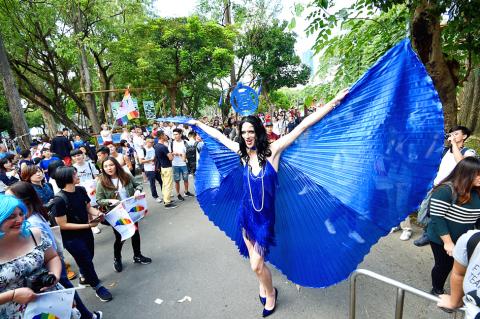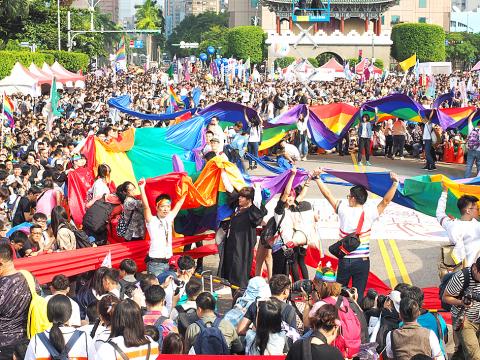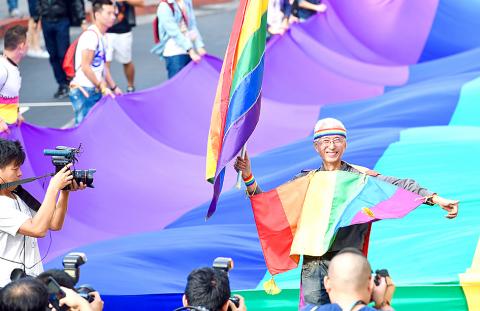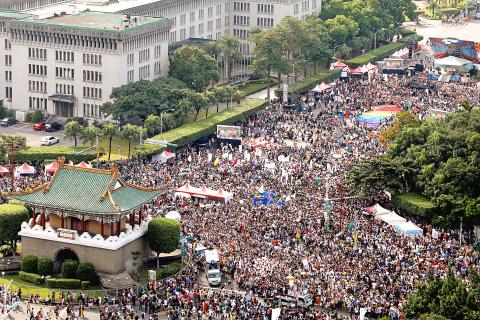The 15th annual Taipei lesbian, gay, bisexual and transgender (LGBT) Pride Parade yesterday drew about 123,000 participants, according to organizers’ estimates, hitting a new record since it was first held in 2003.
At about 1pm yesterday, paraders flooded toward the event’s main stage on Ketagalan Boulevard with 160 attending groups — including the American Institute in Taiwan and 12 groups from Japan and South Korea — divided into nine groups marching along three different routes.
The western route proceeded on Gongyuan Road (公園路), the northern on Zhongshan S Road (中山南路) and the southern on Xinyi Road (信義路).

Photo: Peter Lo, Taipei Times
After a two-hour parade from 2:30pm to 4:30pm, revelers returned to the boulevard for musical performances and group speeches until about 7:30pm.

Photo: EPA-EFE/David Chang
Event organizer Taiwan LGBT Pride Community used the event to promote sex education, saying students should have access to diversified education about different sexual orientations and gender differences.
When people are familiar with different sexual orientations across the spectrum, they will be less likely to discriminate against others who are different from themselves, Taiwan Gender Equity Education Association spokesperson Chuang Shu-ching (莊淑靜) said.
The Council of Grand Justices on May 24 announced its constitutional interpretation of the Civil Code, saying that it is unconstitutional to deny same-sex couples the right to marry and called on lawmakers to amend the code within two years.

Photo: Peter Lo, Taipei Times
The two-year period can be painfully long for many same-sex couples, Green Party Taiwan member Jia Bo-kai (賈伯楷) said, adding that some of his friends have passed away before winning the right to be married.
The Democratic Progressive Party (DPP) is deferring marriage equality legislation because it wants to cater to both supporting and opposition camps, Jia said.
“The DPP does not even have the ability to ‘harvest’ the issue even though the council has paved the way,” he said.

Photo: Reuters/Tyrone Siu
Marriage Equality Platform spokesperson Jennifer Lu (呂欣潔) called on the government to speed up same-sex marriage legislation, adding that the equality of all citizens should come before what the opposition groups call “solidarity.”
Marta Bulawa, a 23-year-old Polish woman joining the parade for the first time with her European friends, said marriage means “security” for gay people.
Loren Letourneau, a 37-year-old Canadian with two children, said sexual orientation is not a choice, but a natural disposition, and he would teach his children to be safe no matter their sexual orientation.
At 4pm yesterday, Premier William Lai (賴清德) wrote on Facebook that the Executive Yuan would follow the constitutional interpretation to propose a bill about same-sex marriage soon.
Meanwhile, both the Happiness of the Next Generation Alliance (Happiness Alliance) and the Alliance of Taiwan Religious Groups for the Protection of the Family (Family Alliance) issued statements in response to the parade’s call for wider sex education.
Gay rights advocates often reduce sex education to merely sexual acts, while students should be protected from such an “improper sex education,” the Happiness Alliance said.
Same-sex marriage advocates have distorted school education by instilling wrong information into students, the Family Alliance said, adding that gay people should not be involved in sex education.

The CIA has a message for Chinese government officials worried about their place in Chinese President Xi Jinping’s (習近平) government: Come work with us. The agency released two Mandarin-language videos on social media on Thursday inviting disgruntled officials to contact the CIA. The recruitment videos posted on YouTube and X racked up more than 5 million views combined in their first day. The outreach comes as CIA Director John Ratcliffe has vowed to boost the agency’s use of intelligence from human sources and its focus on China, which has recently targeted US officials with its own espionage operations. The videos are “aimed at

STEADFAST FRIEND: The bills encourage increased Taiwan-US engagement and address China’s distortion of UN Resolution 2758 to isolate Taiwan internationally The Presidential Office yesterday thanked the US House of Representatives for unanimously passing two Taiwan-related bills highlighting its solid support for Taiwan’s democracy and global participation, and for deepening bilateral relations. One of the bills, the Taiwan Assurance Implementation Act, requires the US Department of State to periodically review its guidelines for engagement with Taiwan, and report to the US Congress on the guidelines and plans to lift self-imposed limitations on US-Taiwan engagement. The other bill is the Taiwan International Solidarity Act, which clarifies that UN Resolution 2758 does not address the issue of the representation of Taiwan or its people in

US Indo-Pacific Commander Admiral Samuel Paparo on Friday expressed concern over the rate at which China is diversifying its military exercises, the Financial Times (FT) reported on Saturday. “The rates of change on the depth and breadth of their exercises is the one non-linear effect that I’ve seen in the last year that wakes me up at night or keeps me up at night,” Paparo was quoted by FT as saying while attending the annual Sedona Forum at the McCain Institute in Arizona. Paparo also expressed concern over the speed with which China was expanding its military. While the US

SHIFT: Taiwan’s better-than-expected first-quarter GDP and signs of weakness in the US have driven global capital back to emerging markets, the central bank head said The central bank yesterday blamed market speculation for the steep rise in the local currency, and urged exporters and financial institutions to stay calm and stop panic sell-offs to avoid hurting their own profitability. The nation’s top monetary policymaker said that it would step in, if necessary, to maintain order and stability in the foreign exchange market. The remarks came as the NT dollar yesterday closed up NT$0.919 to NT$30.145 against the US dollar in Taipei trading, after rising as high as NT$29.59 in intraday trading. The local currency has surged 5.85 percent against the greenback over the past two sessions, central